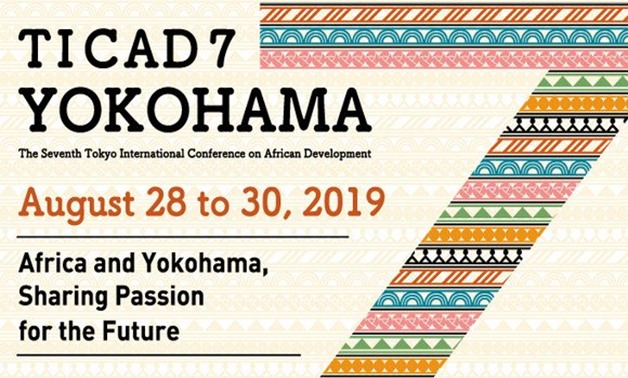
TICAD7 official logo
Yokohama – 28 August 2019: Africa is considered a continent that is abundant in energy and natural resources, with many African countries underwent substantial transformation in their economic and governance environments over the past decade. TICAD is a development forum pioneer that is currently taking place in Yokohama, Japan aiming to accelerate this economic transformation in Africa, deepen sustainable society and strengthen peace and stability in the continent.
This year, the 7th edition of the TICAD will be co-chaired fort the first time by President Abdel Fatah al-Sisi, in his capacity as the head of the African Union, along with Japanese Prime Minister Shinzo Abe. This TICAD comes three months after the G20 summit in Japan, and is the first one to be attended by an Egyptian president.
In the below lines, et will highlight TICAD facts and results thus far:
What is the TICAD?
Initiated by Japan, TICAD stands for the “Tokyo International Conference on African Development,” and is convened every three years alternately in Japan and Africa.
The summit-level international conference is co-organized by the Government of Japan, the United Nations (UN), the World Bank (WB), the United Nations Development Program (UNDP), and the African Union Commission (AUC). Its stakeholders include all African countries and many development partners, including international and regional organizations, partner countries, the private sector, and civil society organizations.
TICAD plays a role to promote connectivity and enhance the capacity of African’s private sector via: technical support, experience sharing on SMEs, promotion of agro-industry expansion, learning from Japan’s Kaize experience to leap-frog technological development for Africa.
What is the outline of TICAD7?
TICAD7 is held in Yokohama, Japan from August 28 to 30. It is the third time for Yokohama to host this biggest international event happening in Japan.
The forum will be attended by 1,500 Japanese businessmen, and 50 Egyptian businessmen. More than 4,500 (based on attendance of TICADV) heads of state and government, as well as representatives of international and regional organizations, civil societies, NGOs and the private sector will participate in the summit.
The agenda of the three-day forum includes several plenary sessions in the morning and the afternoon, in addition to around 170 various sideline sessions.
What is to be discussed at TICAD7?
As mentioned by the Japanese foreign affairs ministry, TICAD7 will focus in its agenda on African development via three pillars, which are:
1- Accelerating economic transformation and improving business environment through innovation and private sector engagement. The key areas include: agriculture, blue economy, qualify infrastructure, debt transparency and sustainability.
2- Deepening sustainable and resilient society. The key areas include: health, education, environment, and disaster and risk management.
3- Strengthening peace and stability. The key areas include: rule of law, good governance, refugee and internally displaced persons.
Examples of TICAD outcomes?
According to statistics published by the Japanese foreign ministry, the number of Japanese enterprises doing business in Africa rose to 796 by the year 2017. Rice production in Sub-Saharan Africa hit 2800 paddies in 2018 as part of an initiative known as the “Coalition for African Rice Development” launched by Japan to support the efforts of African countries aiming at doubling Africa rice production within ten years.
A total of 1, 219 African students are studying at Japanese universities as part of the African Business Education Initiative for Youth (ABE Initiative) that offered African men and women to study at Master’s courses in Japanese universities.
A Safe water access, and hygiene improvement initiative has accomplished water supply plans in regional communities of each African country, besides hygiene projects such as school building construction including toilet facilities and sewage line in elementary and junior high school.

Comments
Leave a Comment